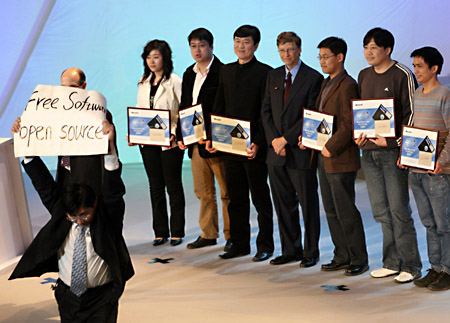Programmer confronts Bill Gates
By Li Qian (Chinadaily.com.cn)Updated: 2007-04-27 17:45
A one-minute protest in front of Bill Gates in Beijing attracted nation-wide attention and sparked a frenzied discussion about whether all programming codes should be made freely available or not.
Thirty-eight-year-old Wang Yang made the headlines of major Chinese newspapers when he stormed an award-giving ceremony attended by the Microsoft Chairman at Peking University. Wang raised a banner that read "Free software, open source", and shouted the same words to the attendees.
 A man holds up a sign after Microsoft Chairman Bill Gates delivered a speech at Peking University in Beijing April 20, 2007. [Reuters]  |
The former programmer and open source programming enthusiast gave himself the nickname "Kaiyuan", meaning "open source" in Chinese. And immediately after he made his public statements, Wang resigned from his job from LPI to disassociate the company from his personal actions.
World-leading software manufacturers keep their core source codes secret, so that they can sell software like operational systems at high prices. But Wang believes software codes are information, not technology, and so it should be shared by all.
Wang thinks all software should be free, and easily downloaded and used by any computer user. He even predicts the end of commercial software sold on the market. He said software companies should open the source codes of their products, to allow ordinary people to use as they like and make their own modifications.
"My actions at Peking University were to arouse people's awareness that open source software is good to them and the development of the software industry, and to encourage them to abandon using expensive commercial software," Wang told China Daily website.
Although he denies the media's interpretation of his protest as an act against the monopoly, he likens his mission to the movie "Antitrust" where he is like the young idealistic computer programmer courted by a Bill Gates-like character for his software program.
The morning of the protest, he wrote a resentful poem in which he compared Microsoft to a wolf, complaining the software giant makes huge profits and pretends to be friends with Chinese computer users.
A spokesperson for Microsoft dismissed the protest, even though Wang hopes Gates will talk to him one day.
The Chinese authorities have no comment about Microsoft possibly monopolizing the software market. Instead, they say they are supportive of China developing its own software, especially operational systems.
Professor Ni Guangnan with the Chinese Academy of Sciences agreed with Wang's open source claim, saying monopolies block innovation.
Wang said he will continue his mission to educate Chinese computer users about the benefits of open source software.
|
||
|
||
|
|